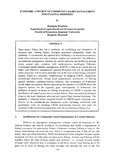| dc.contributor.author | Tokrisna, Ruangrai | |
| dc.date.accessioned | 2019-06-25T09:03:16Z | |
| dc.date.available | 2019-06-25T09:03:16Z | |
| dc.date.issued | 1997 | |
| dc.identifier.citation | Tokrisna, R. (1997). Economic concept of community-based management for coastal fisheries. In Proceedings of the Regional Workshop on Coastal Fisheries Management Based on Southeast Asian Experiences, Chiang Mai, Thailand, 19-22 November 1996 (pp. 169-175). Samut Prakarn, Thailand: Training Department, Southeast Asian Fisheries Development Center. | en |
| dc.identifier.uri | http://hdl.handle.net/20.500.12067/947 | |
| dc.description.abstract | Open-access fishery has led to problems of overfishing and dissipation of resource rent. Among fishery biologist maximum sustainable yields are preferred. To economists, the optimal level of fishing is at maximum economic yield where resource rent and consumer surplus are maximized. Nevertheless, conventional management schemes by central authority are inefficient among tropic coastal state countries with multi-species, multi-gear fisheries, Community-based fisheries management (CBFM) is then in an option for a a better cost effective management schemes Resource rent can be maximized while resources will be more abundant but at the cost of decreasing consumer surplus. There is a plausible underfishing in adopting CBFM, Supportive institutional framework, strong local organization, exclusivity of fishing against outsiders, sedentary/inshore fisheries, and recognition on fisherman social status are positive factors advocating the adoption of CBFM while the negative factors are the opposite, plus heterogeneity of fishermen and problems of equity in access to fishing. Economics of CBFM is actually the distribution of control power due to market failure. There are external elements given to the local fishermen who can only control their internal decisions. The optimum is obtained where marginal benefit of CBFM equals marginal cost. Factors to be considered are transaction costs, including exclusivity and governance costs. In adopting CBFM maximizing resource rent must be combined with minimizing transaction costs for an optimum fishing level. | en |
| dc.language.iso | en | en |
| dc.publisher | Training Department, Southeast Asian Fisheries Development Center | en |
| dc.title | Economic Concept of Community-based Management for Coastal Fisheries | en |
| dc.type | Conference paper | en |
| dc.citation.spage | 169 | |
| dc.citation.epage | 175 | |
| dc.citation.conferenceTitle | Proceedings of the Regional Workshop on Coastal Fisheries Management Based on Southeast Asian Experiences, Chiang Mai, Thailand, 19-22 November 1996 | en |

